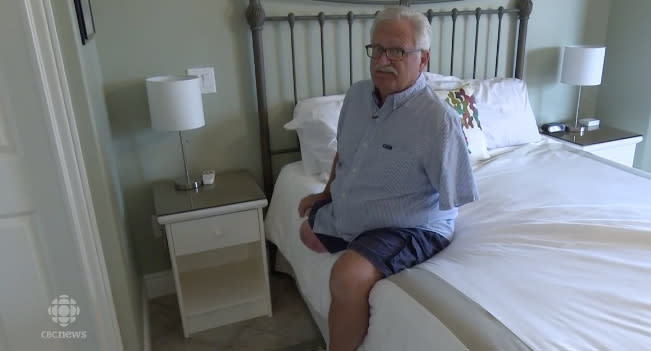Double amputee forced to crawl on floor after airline security confiscates batteries for his electronic scooter

A man who lost an arm and a leg in a work accident recently opened up about being forced to crawl on the floor of his hotel after airline security confiscated the batteries to his electronic scooter. Now he has hired a lawyer and is trying to get his case heard by the Canadian Human Rights Commission.
Stearn Hodge was attempting to board a flight from Calgary Airport in Canada, to Tulsa, Okla. with his wife to celebrate their 43rd wedding anniversary in 2017 when security personnel delivered some distressing news: He would not be allowed to fly with the $2,000 lithium-ion battery that operates his portable scooter because it’s a fire hazard, according to CNN. The spare battery had to go, too.
First, Hodge tried to prove to an agent with the Canadian Air Transport Security Authority (CATSA) and a United Airlines official that he had gotten prior permission to fly with a functioning scooter. He presented documents from the International Air Transport Association (IATA), which said that lithium-ion batteries do present a risk of fire, but the association makes exceptions when it comes to travelers with disabilities. The agents refused to honor the documents.
Hodge was devastated. As an amputee, he relied on his scooter to get around on his own; without it he was lost. He told CNN he once tried to wear a prosthetic leg but had to give it up because of pain and the risk of infection. What the CATSA agent offered next, though, really got under Hodge’s skin — a wheelchair.
“How’s a one-armed guy going to run a wheelchair?”Hodge asked CBC. “How am I going to go down a ramp and brake with one hand? But that shouldn’t even have to come up.”
Hodge and his wife flew without the batteries, but by the time they got to their hotel, he found himself in crisis. He spent much of his vacation confined to his bed. When he had to use the bathroom, he resorted to crawling on the floor in front of his wife, an experience he describes as humiliating. “They’re taking my legs — and not only that, my dignity,” he said to CBC.
For the couple, their entire 3-week anniversary getaway was completely ruined.
“An anniversary is supposed to be all about remembering how you fell in love … and keeping that magic alive,” said Hodge. “And those things were denied. I’m crawling across the floor and it is pathetic.”
United Airlines tried to rectify the situation with Hodge directly, but for him, their attempt just added insult to injury. In an email to Hodge, United Airlines official Tatricia OrijaIn wrote, “It appears we were in violation of federal disability requirements.”
She then apologized for the “inconvenience” and offered both Hodge and his wife an $800 travel certificate.
“Inconvenience is when it rains on your holiday,” said Hodge. “This was a … life-changing moment for me and my wife.”
While one might imagine that flying without scooter batteries is a universal safety precaution, Hodge said that’s not true. He and his wife travel once or twice a year, often internationally, and he told CBC the only place he ever has a problem is Canada — in fact, he’s had the same problem about a dozen times passing through Canada, and he said the anticipation of it now gives him anxiety.
“I have flown through Europe, the United States and Mexico since 2015 with these batteries and have never been detained or harassed because of them,” he said. “It is only in Canada that I have been relentlessly detained.”
Now Hodge is hoping to have his day in court. In September, the Canadian Human Rights Commission responded to a complaint from Hodge, referring it to the Canadian Transportation Agency. But the agency was not empowered to reimburse Hodge for his batteries.
On May 9, Hodge’s lawyer, John Burns, will ask a federal court judge to get the case in front of the commission. His legal defense will lean mainly on the Canadian Human Rights Act, which allows for up to $20,000 in damages for each count of pain and suffering, and up to another $20,000 if the discrimination is “wilful or reckless,” according to CBC.
“It’s a failure of the Canadian Human Rights Commission to grant access to the remedy that the statute provides,” Burns said. “People with disabilities should be taken seriously. You don’t take away somebody’s legs and then describe it as an inconvenience. No, this is an injury.”
In a statement, United Airlines told Yahoo Lifestyle, “We are looking into the allegations, and because of the pending litigation, we are unable to provide further comment. That said, the experience described falls far short of our own high standard of caring for our customers. We are proud of the many steps we have taken over the past few years to exhibit more care for our customers and we are proud to operate an airline that doesn’t just include people with disabilities but welcomes them as customers.”
Hodge says that since the trauma, he hasn’t been the same — but he is unrelenting in his pursuit of justice. To cover his legal bills, he’s even selling his beloved Corvette. But it’s well worth it, he feels, because he’s fighting for his own honor and for that of other travelers with disabilities.
“The thing I would love more than the compensation,” Hodge told the CBC, “is the [legal] decision that someone can go to and say, ‘You did it here, you can do it for me.'”
Read more from Yahoo Lifestyle:
Students say their service dogs weren’t allowed in school pictures: ‘If I’m a senior, he’s a senior’
Follow us on Instagram, Facebook, and Twitter for nonstop inspiration delivered fresh to your feed, every day.

